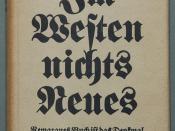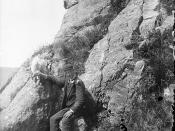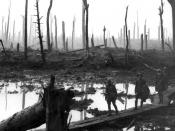In his novel "All Quiet On The Western Front"- first published in German as Im Westen nichts Neues in January 1929 - German Author Erich Maria Remarque purposefully destroys the nationalistic ideas readers at the time would have had about the war. He claims in his epigraph - "This book is intended neither as an accusation nor as a confession, but simply as an attempt to give an account of a generation that was destroyed by the war - even those who survived the shelling." He presents the brutality of the First World War, in which he took part, through vivid descriptions of trench warfare and the changes it makes to the minds of the group of young German soldiers he concentrates on. The novel centres around the experiences of narrator Paul Bäumer and his company, as one by one they lose the lives which were already ruined by war.
Remarque also comments in the epigraph that his novel is intended for a 'generation' of men who, even though they escaped the shells, were destroyed by war. The generation he writes about is Germany's youth, pushed into the war by their nationalistic elders who have never fought in a war. In the novel, this theme is shown through Paul and his classmate's teacher Kantorek.
"There were thousands of Kantorek's, all of them convinced that they were acting for the best, in the way that was most comfortable from themselves. But as far as I'm concerned, that was the very root of moral bankruptcy. They were supposed to be the ones who would help us... but the first dead man I saw shattered this conviction"
Paul describes how the men have matured quickly under the pressures of their situation. This made them lose respect civilians they previously held in high regard,


